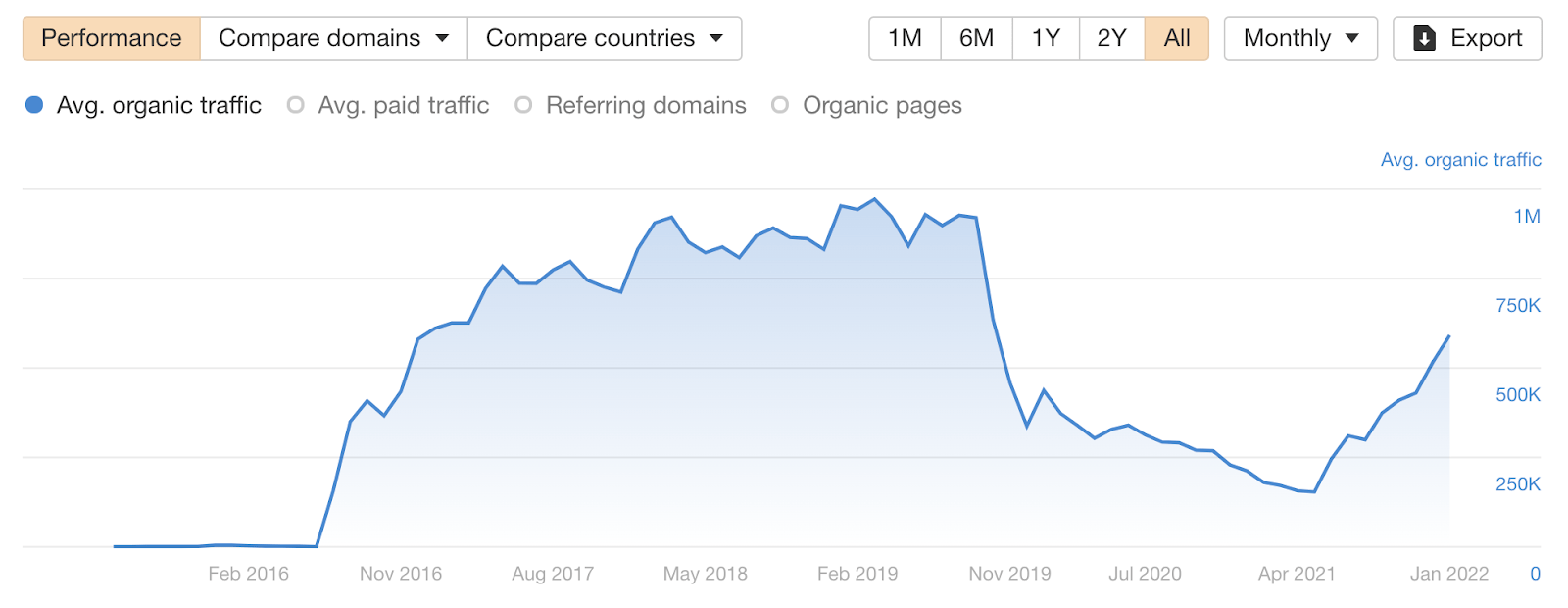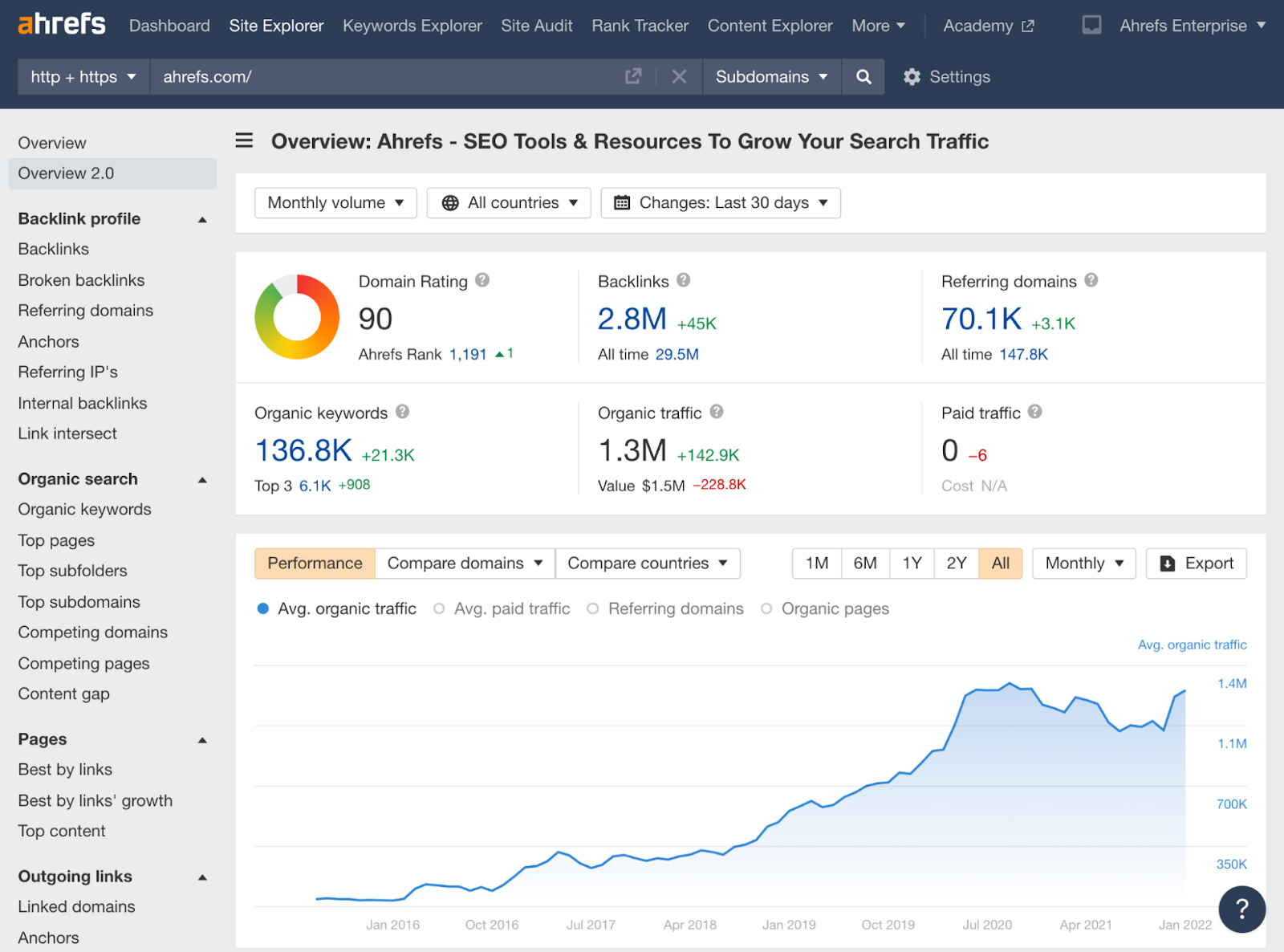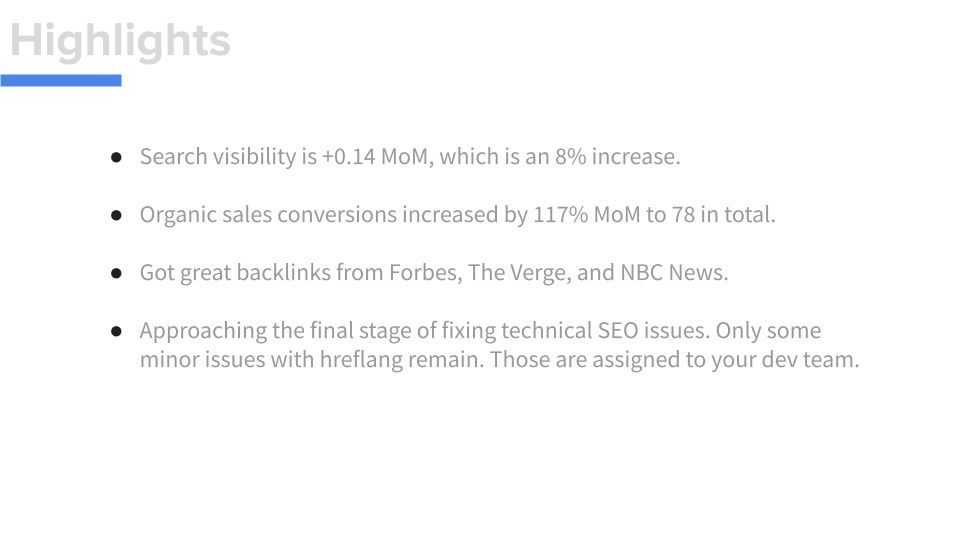SEO, Social Media, Web Development
Hiring an SEO Consultant? Ask These 9 Important Questions
- By Brett Belau
17 Feb

The job of an SEO consultant is to create and manage SEO tasks to improve a website’s performance in search engines. All of this should ultimately lead to increasing the business’s revenue.
Hiring a great SEO consultant can skyrocket your business, as organic search is the main traffic source for many websites. Alternatively, a wrong hire can do a lot of harm that may take a long time to fix.
So what does it take to separate the wheat from the chaff? Ask your candidates the following nine questions to make the right hiring decision:
- What’s your track record of success?
- What do you do best?
- How much can your work impact my business?
- Do you guarantee the results of your SEO work?
- What’s your approach to Google’s SEO guidelines?
- What SEO tools do you use, and how do you use them?
- What does your SEO reporting look like?
- How much do you cost?
- How do you hand over the work when we part ways?
Let’s dive into each of them so you’ll know what to look for in your candidates’ answers.
There are three ways to come across a potential SEO consultant:
- You get a reference.
- You get familiar with them based on their online and offline presence.
- They reach out to you, offering their services.
If it’s the first case and you really trust the person recommending the consultant, feel free to skip most of the qualifying questions in this article. However, for the second and third cases, you should first focus on a candidate’s track record of success. And that can be tricky sometimes, as people generally present themselves in the best light possible.
So what’s tricky here? Let’s see an example. Last year, I was asked to lead an SEO workshop for one of the Big Four accounting firms. If I had accepted, I’d have just placed its logo on my website and claimed the firm was my client. That would technically be true but also a bit deceiving (regarding my SEO consulting experience).
Any SEO consultant should be able to disclose a few websites they were working on. Most consultants list a few clients on their websites. But this information is not often followed by testimonials or case studies reflecting the consultants’ performance. If you’re missing this information, you can still get it before getting in touch with them.
You can open Ahrefs’ Site Explorer, plug in one of the websites, and check the organic traffic chart in the overview:
If you see an upward trend, then it’s a good first sign. But always discuss a few cases with the consultant when you get in touch with them. They can tell you the periods when they worked for a certain client and even provide the charts and numbers, as anyone can look up the data.
Sometimes, you won’t see much growth or may question the performance in other ways. Let the consultant justify their results. SEO is a long-term game, and you rarely see any significant changes in organic traffic in the first months of cooperation.
There’s no one-size-fits-all SEO consultant. Instead, try to find the best match for your business.
For example, I reject all e‑commerce offers. E‑commerce SEO is a category on its own. I’ve never done it, and there are many other consultants who can do a better job for cheaper rates. I’ve always worked for SaaS businesses, and that’s where I can provide the most value.
Besides a general knowledge of marketing, an SEO consultant should be good at all SEO disciplines (on-page, off-page, and technical). However, very few manage to be experts in all of them, and that’s not necessary. Some consultants focus on just one area like link building or technical SEO. They double down on their strengths and offer a niche service. That’s a good thing.
This question simply helps both sides understand if there’s a good fit between your needs and their focus, knowledge, and expertise.
There are a few factors that come into play for estimating the potential impact of SEO on your business:
- Organic traffic potential – Is there a high search demand in your business category?
- Marketing strategy – How much should organic search be prioritized among other marketing channels?
- Developer resources – Do your developers have the room to implement required changes in a timely manner?
- Content creator resources – Do you have a team to produce SEO content? If not, do you have the necessary budget to hire freelancers?
- Link builder/PR resources – Do you have a link builder and/or PR specialist? If not, can you afford to hire them?
A good consultant should assess all of these factors when they’re asked about the potential impact of their work. To be clear, don’t expect the consultant to give you any numbers at this stage. For now, your goal is to come to an agreement that investing in SEO is the right choice.
If any SEO consultant guarantees their work will skyrocket your organic traffic—run. Yes, this is a dealbreaker.
No matter how good an SEO consultant is, they can’t guarantee any results in SEO. There are just so many variables (ranking factors) involved. Yes, you’re hiring someone to make a positive impact, and there’s a high probability that a good consultant will pay off quite quickly. But it’s never 100%, and you’ll often have to wait many months to see any positive results.
Here’s another example. I got involved in consulting for a website. It didn’t get back on track after being severely hit by Google’s algorithm update despite having great SEO consultants all along. I’ve found some new opportunities and helped fix a few things. But I can’t attribute any success to these efforts because it still took another six months for the organic traffic trend to look good again:

An extreme example of a website that was managed by great SEO consultants but saw its organic traffic improve only after a long time. Screenshot from Overview 2.0 report in Ahrefs’ Site Explorer.
By the way, the surge in traffic happened after another algorithm update. We, SEO consultants, have done good work. It just took a lot of time for the results to kick in (almost two years in this case).
There’s no right answer. But leaning toward the extremes (doing everything/nothing according to Google) should be taken with caution.
Google has become much better in SEO recommendations and documentation in the past few years. However, every good SEO disagrees with Google’s guidelines now and then. Some more than others.
For example, the main topic of disagreements between Google’s statements and SEOs is link building. What works in practice when building links and what Google recommends are sometimes two completely opposite approaches.
A good sign is hearing about a few examples where the consultant disagrees with Google and why.
Every good SEO consultant needs to use one of the three leading all-in-one SEO toolsets: Ahrefs, Semrush, or Moz. Hearing one of these brands is a good start for this question. Using Google Search Console and Google Analytics is taken for granted.
However, having access to the best SEO tools is just the beginning. Let the consultant tell you a bit about their processes. How do they audit a website? How do they find link building opportunities? What about keyword research?
There can be countless right or wrong answers on using the tools. If you’re not an SEO expert, you won’t be able to judge them. But whatever the answers are, they should build more confidence and rapport.
You can easily tell a good SEO consultant from a bad one based on their SEO reports. If they provide an example report, here’s what you should look out for. A good report is concise and easy to go through; you should also understand the gist of it in a few minutes. Here’s an example of a good slide taken from my SEO report template:
But most consultants won’t send you other clients’ reports due to non-disclosure agreements and sensitive data. Inquiring about their SEO reporting process is the second-best choice here.
What to look for here specifically? Well, see if they talk about SEO KPIs and how they approach them. That’s a dead giveaway. You want to hear about metrics tied to your business growth. These are, most universally, organic conversions and share of voice (search visibility).
Beware that organic traffic growth alone shouldn’t be a KPI unless you monetize all your website traffic using display advertising networks.
Sidenote.
What I’m talking about here only applies to hiring someone for overall SEO consultation. If you’re hiring a link builder or a technical SEO, then they probably can’t tie any of their metrics to your business growth directly.
Another crucial thing is the combination of data sources. Every good SEO consultant should create reports by combining metrics from Google Search Console, Google Analytics (or alternatives), and independent SEO toolsets like Ahrefs. That’s because every tool has its unique data. Also, some metrics are just more accurate in one tool than another.
It’s best to have some pricing estimates as soon as possible so that neither side wastes time. Some consultants disclose their rates publicly, but you always need a quote for your specific needs.
You’ll mostly encounter three types of pricing:
- Hourly rate – This is the most straightforward pricing model. It’s the most common one in the Czech Republic (where I live). But it’s not so popular in the West, according to my observations.
- Project-based pricing – This is most likely to be used if you need SEO help in a certain area for a shorter period of time.
- Monthly retainer – This is popular for long-term cooperations. You agree on a block of time the consultant will provide each month to your business and how much it will cost you.
Some consultants use all three pricing models, while others stick to just one. You should also talk about the minimum contract length and payment terms.
SEO can be a lucrative profession, so expect the best consultants to be quite expensive. On top of that, it’s likely the demand is higher than what they can meet, so some consultants are picky about new clients.
Of course, the pricing will drastically vary depending on the country. In the U.S. (and other countries with a high purchasing power parity), you should expect to pay at least $100 per hour to get a solid SEO consultant. To hire the best English-speaking consultants, you can expect to be charged $200+ hourly rates.
Recommended reading: SEO Pricing: ~350 Agencies, Consultants, and Freelancers Reveal How Much SEO Costs
You won’t work with your consultant forever. Any consultant should try to do their best to hand over their work and ensure an easy transition when you hire someone new. You want to be certain your consultant will do that.
Actually, one of the first things any good consultant should ask you at the beginning of your cooperation is your SEO history. Has anyone already done keyword research? Is there a content plan? What about a list containing the statuses of technical SEO issues and opportunities? Link prospecting and outreach lists? What do your past reports look like? What has been done and why?
You see, there’s a ton of information and data you can provide to your new consultant that can save time and money. It can also reveal potential issues that may hinder your SEO performance.
PRO TIP
Make sure that you own your data and don’t grant admin access to people outside of your organization. I’ve heard horror stories about consultants and even agencies that created or overtook Google Analytics and Google Search Console accounts and then refused to hand over the access.
Final thoughts
Judging the expertise of a potential SEO consultant isn’t easy when you’re not familiar with SEO yourself. But you can very well assess their communication skills based on the nine questions above.
If they don’t explain the SEO stuff with ease, just say “it depends” without going into more details, or give iffy answers that just don’t feel right, you’re probably better off hiring someone else.
So where do you find the best consultants? It may be tempting to use Google because, well, ranking at the top must mean that it’s good at SEO, right? Yes, but you’ll be missing out on potentially better fits. After all, there are way more great consultants than top search results.
I recommend you ask people who have hired SEO consultants in the past, your social circles, or SEO experts. Even if you don’t hire them for SEO consulting, they can help you with some recommendations.
Any questions? Or more ideas to qualify SEO consultants? Ping me on Twitter.
Source: ahrefs.com, originally published on 2022-02-17 11:16:11
Connect with B2 Web Studios
Get B2 news, tips and the latest trends on web, mobile and digital marketing
- Appleton/Green Bay (HQ): (920) 358-0305
- Las Vegas, NV (Satellite): (702) 659-7809
- Email Us: [email protected]

© Copyright 2002 – 2022 B2 Web Studios, a division of B2 Computing LLC. All rights reserved. All logos trademarks of their respective owners. Privacy Policy



![How to Successfully Use Social Media: A Small Business Guide for Beginners [Infographic]](https://b2webstudios.com/storage/2023/02/How-to-Successfully-Use-Social-Media-A-Small-Business-Guide-85x70.jpg)



![How to Successfully Use Social Media: A Small Business Guide for Beginners [Infographic]](https://b2webstudios.com/storage/2023/02/How-to-Successfully-Use-Social-Media-A-Small-Business-Guide-300x169.jpg)


Recent Comments